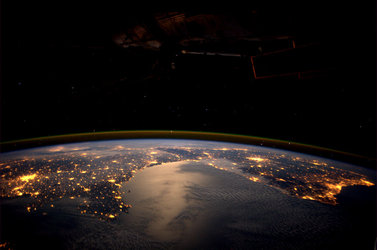Earth from Space: Night lights
This week we look at two images of Europe at night showing lights from sources in cities and along roads. The images were acquired by the United States’ DMSP satellites.
The images show night illumination for 1992 and 2010.
Bright areas highly correlate with high population density – such as the densely populated cities like London, Paris and Rome.
Coastal areas are also more populated than inland regions, making the outline of Europe clearly visible in these night images.
Increased illumination in the second image is also an indicator of economic growth. For example, lights in Poland in 1992 appear dim, but are multiplied in the 2010 image. Over that 18-year period, the country’s gross domestic product jumped some $377 billion.
This is evident in all areas pictured in the animation.
But by indicating population and economic growth, bright spots on these images also represent areas of high energy consumption, emissions and pollution – factors that greatly contribute to climate change.
On 31 March, millions of people around the world will switch off their lights for 60 minutes in a demonstration against climate change and to promote a more sustainable lifestyle.
This sixth annual 'Earth Hour' is organised by the World Wildlife Fund and supported by ESA.
This year, ESA astronaut and WWF ambassador André Kuipers will photograph Earth from the International Space Station as people pull the plug on all non-essential lights from 20:30 to 21:30 local time.
For more information, visit the Earth Hour website.
The DMSP satellites are run by the National Oceanic and Atmospheric Administration, monitoring the meteorological, oceanographic and solar–terrestrial physics environments for the US Department of Defense. Data from DMSP’s Operational Linescan System can be used to see city lights.
The Image of the Week is featured on ESA Web-TV, broadcast online every Friday at 10:00 CET.















 Germany
Germany
 Austria
Austria
 Belgium
Belgium
 Denmark
Denmark
 Spain
Spain
 Estonia
Estonia
 Finland
Finland
 France
France
 Greece
Greece
 Hungary
Hungary
 Ireland
Ireland
 Italy
Italy
 Luxembourg
Luxembourg
 Norway
Norway
 The Netherlands
The Netherlands
 Poland
Poland
 Portugal
Portugal
 Czechia
Czechia
 Romania
Romania
 United Kingdom
United Kingdom
 Slovenia
Slovenia
 Sweden
Sweden
 Switzerland
Switzerland































